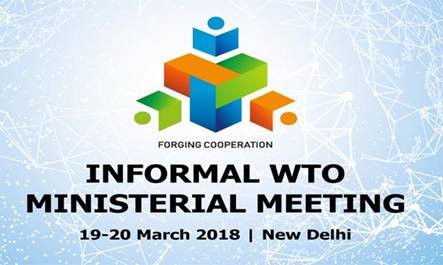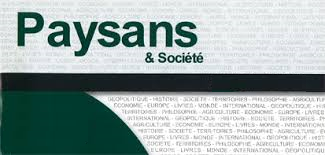
Dans l’un des rares communiqués de presse diffusés à l’issue de la conférence (que nous reproduisons ci-dessous1), les organisateurs indiens font état de l’ampleur du blocage entre pays développés et pays en développement. Par la voix de l’Inde, les seconds reprochent aux premiers d’avoir profité de l’Accord Agricole pour augmenter leurs exportations et de désormais faire mine de se désintéresser de la recherche d’une issue aux divergences constatées sur les questions agricoles et de sécurité alimentaire : « L’agenda de l’Inde à l’OMC de résoudre les problèmes en suspens concernant le multilatéralisme en matière d’agriculture et de développement, risque d’être mis de côté par les efforts conjoints des Etats-Unis, de l’Union européenne, du Japon, du Canada, de la Norvège et de Singapour, parmi d’autres, pour prioriser le travail multilatéral sur les règles du e-commerce. »
Ce nouvel épisode révèle un peu plus encore la crise profonde dans laquelle s’enfonce le multilatéralisme. Les faux semblants sont de moins en moins de mise et les pays en développement ne veulent plus se faire imposer ce qu’ils considèrent comme un jeu de dupes. Face à eux, il sera difficile de continuer à jouer les vierges effarouchées par la crainte d’un retour au protectionnisme. Sans une coopération à minima pour éviter les embardées des prix internationaux, à la hausse comme à la baisse, qui pourra reprocher aux pays en développement d’assumer leur sécurité alimentaire ?
Frédéric Courleux, Directeur des études d’Agriculture Stratégies
India hosted the Informal WTO Ministerial Meeting is being held in New Delhi on 19-20 March 2018. India is one of the founding Members of the World Trade Organization. The main aim of the meet was to once again rejuvenate the spirit of negotiations between the developed and the developing countries. This was the second mini-ministerial meeting being hosted by India, after the first one being held in 2009 in New Delhi.
“WTO Ministerial Meeting was an exercise to create confidence and bring countries together to discuss common issues like food security and agriculture. Although there are differences among countries, there is no substitute to dialogue, bilateral and multilateral”, said the Minister.
Informal discussions continued throughout the two days and the delegates explored the option for reinvigorating the WTO. The meeting concluded with a Chair’s Summary to be delivered on his own responsibility by the Commerce & Industry Minister of India.
During the interaction, various aspects related to multilateral trade came up for discussion. Several Ministers appreciated India’s initiative in hosting this Ministerial meeting.
One of the main topics under discussion was agricultural trade, which, according to India, should be prioritized and conclusive. As a majority of the population of the developing countries relies on agriculture, food security and livelihood therefore become the prime concerns. Therefore, settlement on agricultural trade is crucial for stronger multilateral ties.
It’s important to understand the intricacies of agricultural trade and how it is asymmetrical in the present scenario, especially for the developing world. Hence there is a need to settle it by providing a level-playing field to all. This argument has been the main bone of contention by India and other developing countries since the commencement of the Doha ministerial in 2001. The pivotal pillars to comprehend agricultural trade are market access, domestic subsidy and export competition.
Under WTO norms, a member-country’s food subsidy bill should not breach the limit of 10 per cent of the value of production based on the reference price of 1986-88. India has been seeking amendments to the formula on stockholding, anticipating that full implementation of its food security programme could result in crossing the WTO subsidy limit.
India continued to stress on the reduction of farm subsidies by developed countries and resisted inclusion of new issues on the negotiating table like e-commerce and investment facilitation into the ongoing Doha Round of talks that have a developmental agenda in case these dilute the commitment to complete the existing agenda.
The issue of protectionism and the US President Donald Trump slapping import tariffs of 25 per cent on steel and 10 per cent on aluminium last week, unfolding the prospect of an all-out global trade war, was also raised at the New Delhi meeting. Moreover, the global trade appears fragile with certain developed countries threatening to retaliate the duty hike on steel and aluminium products by the Trump administration.
It is imperative to note here that the talks at the WTO’s 11th ministerial conference collapsed after the US went back on its commitment to find a permanent solution to the public food stockholding issue, a key matter for India.
From the developing countries’ perspective, the other key issues that need to be settled are the designation of Special Products (SP) and the agreement over the coverage of Special Safeguard Mechanism (SSM). The developing countries want to designate a set of SPs, which are critical from the viewpoint of their food security, livelihood and rural development. In addition, the SSM may be available to them as a defence against a sudden surge in imports or the fall in international commodity prices.
The developing countries say that the slow implementation of the Agreement on Agriculture (AoA) has resulted in a negative impact on food security, livelihood and rural development in poor countries, as it has enhanced exports from the developed countries rather than promoting imports by them.
Therefore, the developing countries are now insisting that the inclusion of SPs and the SSM should form an integral part of the modalities and outcome of agricultural negotiations to protect their survival instead of giving false promises of adding to their trade gains.
Although it looks clear that India and other developing countries have drawn their plans well to focus on this mini-ministerial, yet the motive of the developed countries is to bring in new issues such as e-commerce, micro, small and medium enterprises, investment facilitation, etc, to the fold of the WTO negotiations. In fact, the developed countries are interested to ignore the so-called Doha Development Agenda and include other trade issues that are of primary importance to them and will provide better trade gains to the developed economies.
Therefore, India’s WTO agenda, of addressing the unresolved issues in agriculture and development multilaterally, risks being sidelined by the collaborative efforts of the US, the EU, Japan, Canada, Norway and Singapore, among others, on intensifying plurilateral work on e-commerce trade rules, in New Delhi. It is imperative that WTO members are mandated to work on those primary unresolved issues under the Doha agenda instead of firming up their opinion on other issues.
1 https://www.ibef.org/blogs/india-hosts-informal-wto-ministerial-meeting










